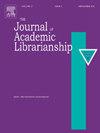Undergraduates' appraisal and coping responses to dis/misinformation issues on social media: Implications for information literacy education
IF 2.3
3区 管理学
Q2 INFORMATION SCIENCE & LIBRARY SCIENCE
引用次数: 0
Abstract
Social media is increasingly recognized as a prominent stressor and source of societal problems (e.g., dis/misinformation) that impact students' growth and well-being. Academic libraries, as leaders in information literacy (IL), can play an important role in mitigating the problem. This includes advancing a holistic IL education, focusing not only on students' intellectual growth but also their affective responses to informational issues, as some affective reactions may lead to unproductive behaviors. To discover areas warranting IL interventions, the current study identified a typology of undergraduates' responses to dis/misinformation problems on social media. Applying the Transactional Model of Stress and Coping by Lazarus and Folkman, the study analyzed students' Twitter usage, cognitive appraisals, and coping responses (U-A-C) to dis/misinformation on Twitter. Two waves of survey were conducted, collecting a total of 1735 responses from undergraduates. The study identified five user profiles. The most prevalent profile (36 % of the sample) showed scant coping responses to dis/misinformation issues in all three categories (escape-avoidance, planful problem-solving, and seeking social support). Demographic differences (including gender and age) in U-A-C profiles were also found. The results revealed several patterns that IL education may need to address. For instance, one user profile showed low primary and secondary appraisals (i.e., low levels of perceived importance and self-efficacy related to addressing dis/misinformation problems) and high escape-avoidance coping, which would benefit from fine-tuned IL training that not only develops students' skills and self-confidence in IL, but also seeks to reduce avoidance behaviors. Implications for IL training and research are discussed.
大学生对社交媒体虚假信息的评价与应对:对信息素养教育的启示
社交媒体越来越被认为是影响学生成长和福祉的一个突出的压力源和社会问题(例如,谣言/错误信息)的来源。高校图书馆作为信息素养的引领者,可以在缓解这一问题上发挥重要作用。这包括推进全面的信息素养教育,不仅关注学生的智力发展,还关注他们对信息问题的情感反应,因为一些情感反应可能导致非生产性行为。为了发现需要IL干预的领域,目前的研究确定了大学生对社交媒体上的虚假/错误信息问题的反应类型。本研究运用Lazarus和Folkman的压力与应对的交易模型,分析了学生在Twitter上的使用情况、认知评价和应对反应(U-A-C)。我们进行了两轮调查,共收集了1735名大学生的反馈。该研究确定了五种用户档案。最普遍的情况(36%的样本)在所有三个类别(逃避-回避,有计划的解决问题和寻求社会支持)中都表现出对虚假/错误信息问题的应对反应不足。还发现了U-A-C概况的人口统计学差异(包括性别和年龄)。结果揭示了IL教育可能需要解决的几个模式。例如,一个用户档案显示初级和二级评价较低(即,与解决错误信息问题相关的感知重要性和自我效能水平较低),而逃避-回避应对水平较高,这将受益于精心调整的IL培训,该培训不仅培养了学生在IL方面的技能和自信,而且还寻求减少回避行为。讨论了IL训练和研究的意义。
本文章由计算机程序翻译,如有差异,请以英文原文为准。
求助全文
约1分钟内获得全文
求助全文
来源期刊

Journal of Academic Librarianship
INFORMATION SCIENCE & LIBRARY SCIENCE-
CiteScore
5.30
自引率
15.40%
发文量
120
审稿时长
29 days
期刊介绍:
The Journal of Academic Librarianship, an international and refereed journal, publishes articles that focus on problems and issues germane to college and university libraries. JAL provides a forum for authors to present research findings and, where applicable, their practical applications and significance; analyze policies, practices, issues, and trends; speculate about the future of academic librarianship; present analytical bibliographic essays and philosophical treatises. JAL also brings to the attention of its readers information about hundreds of new and recently published books in library and information science, management, scholarly communication, and higher education. JAL, in addition, covers management and discipline-based software and information policy developments.
 求助内容:
求助内容: 应助结果提醒方式:
应助结果提醒方式:


